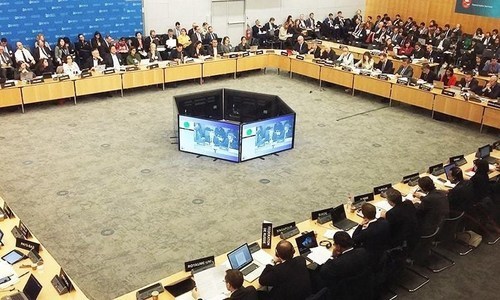ISLAMABAD: Finance Minister Asad Umar on Wednesday said the rising inflation and high fiscal deficit were the country’s biggest challenges at present and sought proactive contribution of the National Assembly’s finance committee to minimise their impact and protect the most vulnerable.
Testifying before the National Assembly’s Standing Committee on Finance and Revenue, the finance minister also revealed that taking an unusual move India had circulated its separate assessment of Pakistan’s performance to comply with the Financial Action Task Force (FATF) conditions even though it was also a joint vice president of the review group. He said the major challenge for Pakistan to move out of the FATF’s ‘grey list’ was “to apprehend, prosecute and sentence” high-risk elements of the proscribed organisations considered threat to the financial system because of terror financing and money laundering. “That is the real challenge and the highest priority” for Pakistan to show compliance, he said.
Reveals India has circulated its separate assessment of Pakistan’s performance to comply with FATF conditions
The minister said the finance committee should play a proactive role and prepare a document for the government, suggesting framework on growth model, resource mobilisation, increasing saving rates, trigger investments for creating jobs and reducing poverty to help the government prepare the upcoming budget. He said the fiscal challenges were so serious because of political objectives of the previous government that corrective measures — increase in electricity and gas rates — were understood to cause inflation. “Inflation is a big worry and how to protect people is the priority,” he said, asking the committee to suggest how to do that.
Opposition members having economic background, including Syed Naveed Qamar of the PPP and Dr Aysha Ghous-Pasha of the PML-N, said the committee would contribute whatever it could. However, they said, the committee could not operate in a vacuum. Therefore, they added, the government should provide a framework of its plan keeping in mind the requirements of the upcoming IMF programme along with the costing of reform and stabilisation programme so that they could fill in with their bit of expertise or suggestion.
The finance minister said the International Monetary Fund (IMF) was against the payment of tax refunds, but “we have done that also”. He said the government had not reached an agreement with the IMF so it still had the flexibility to make policy choices even though the gap in the position of the government and the IMF significantly came down since the IMF mission had left Pakistan in November last year. He said the IMF side believed that the steps proposed by the government were not enough to address challenges.
Mr Umar said the geopolitical situation could play a role but it would be helpful for the government if parliament expressed its views on such matters. He said the IMF wanted totally market-based exchange rate along with greater autonomy to the central bank and higher interest rates.
He said the interest payments alone would be Rs400 billion higher than budgeted, even though expenditure of the civil government had increased only by 3.3 per cent. He agreed to provide terms and conditions of all foreign loans to the finance committee soon after the signing of agreements in future.
The minister said Pakistan had complied with the FATF targets regarding risk-assessment set for January by placing eight proscribed organisations in a high-risk category and the FATF accepted this compliance.
He said that during a recent review by the International Cooperation Review Group in Paris, Pakistan came to know through friendly nations that India had launched an aggressive campaign to get Pakistan blacklisted. He said Indian ministers had openly issued hostile statements against Pakistan to do everything possible to isolate the country. Therefore, he added, Pakistan also demanded removal of Indian vice president from the review group.
Published in Dawn, March 13th, 2019














































